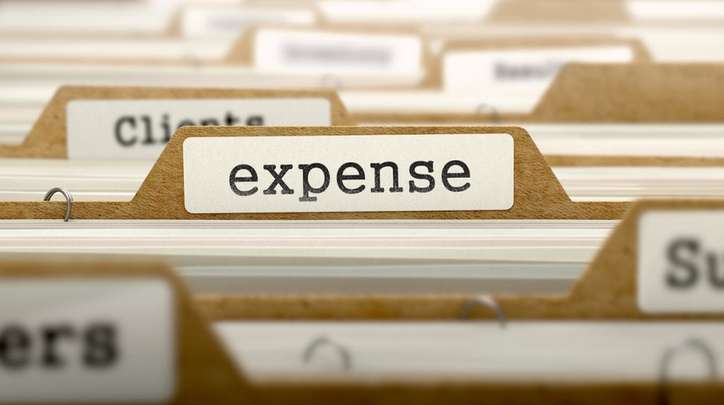By utilizing business expense categories, you can put your costs into groups for internal accounting and tax reporting. This will help you organize your business costs even as we discuss more small business expense categories for taxes, the IRS list, and the spreadsheet.
Small Business Expense Categories
Business expense categories are the costs you can put into groups for internal accounting and tax reporting. These are the business expense categories for small businesses to consider.
#1. Advertising/Marketing
Basically, the direct marketing and advertising costs are included in the costs paid to advertisers and marketing firms for the creation of promotional items.
#2. Fees (subscriptions)
There are expert business organizations that charge fees to become members. Hence, you can remove the cost of subscriptions from your taxes.
#3. Insurance
You can also lower the costs of insurance for your business, such as liability, health, and real estate insurance. Automobile insurance premiums for a personal automobile are more difficult to understand. Hence, to utilize the exact expense approach and reduce a flat mileage rate, you must figure out how much it costs to operate the car for the amount of total use that is for business purposes.
#4. Fees for banking services:
Basically, tax deductions are available for interest spent on business mortgages, credit lines, and company credit cards. Fees charged by the bank, such as maintenance fees and overdrafts, are also taken into consideration.
#5. Continuing Education
Training and development expenses for employees, including seminars and educational fees, Plus, different expenses for travel and meals should be kept track of.
#6. Payments for interest accrue
All credit lines are being paid off on time. Meanwhile, small business loans and business credit card bills fall under this category.
#7.Travel Expenses
Expenses in this category are frequently scrutinized by businesses. Hence, check your company’s expenses for any business trips that take you outside of your city or area of residence.
#8. Employee Benefits
You can deduct the cost of some benefits; such as insurance for people with disabilities, life insurance, support for child care, medical insurance, and supportive services. However, keep in mind that this is one major area where firms tend to overspend, along with their employees’ insurance plans.
#9. The cost of office supplies and equipment
Sanitary items, bulbs, notes, furniture, and even refreshments for workers can be deductible as consumables. Your business expenses also encompass anything from website hosting, buying tools, payroll, and taxes.
#10. Utilities
Power supply, internet, sewerage, and trash collection are all entirely deductible for business buildings. You can deduct utilities for a home that is used as an office per the area of your home used for business purposes.
#11. Salaries and other monetary benefits
It is possible to deduct the cost of paying employees’ wages, bonuses, and other forms of compensation. Contributions to families and loved ones can even be included in compensation, as long as the money was paid via payroll and the person working for your firm. It is necessary to take into account the price spent.
#12. Affordability of medical care.
Healthcare costs for your employees are included in this. Self-employed insurance costs are another possibility.
#13. Loan Interest
A business owner who buys a building or borrows money to build or improve his or her house may be entitled to deduct the interest paid on that loan.
#14. Costs of Expertise and the Provision of Business Services
Expenses you made on your lawyer, auditor, and consultant for advice on business issues, taxes, and governmental laws. As well as other legal or financial concerns may be deductible as business services. Payments to organizations that provide routine and typical business-related services, like sanitation and administrative services, are not subject to this deductible expenditure.
#15. Expenses for Entertainment and Recreation
The TCJA largely eliminates the ability of businesses to deduct the cost of transporting clients or consumers to cultural or sporting events. That’s a letdown for business owners who rely on events like golf tournaments and concerts to foster consumer ties. Whereas these costs are, in most cases, not tax-deductible, they may nevertheless be excellent investments in benevolence. However, the government is unlikely to pay you, so use some good business expense management skills and consider purchasing a terrace or what you see fit.
#16. Business insurance
Insurance premiums for estate and accident, employees’ remuneration, disability, and health care are some of the many types of business insurance that may be deductible from a company’s profits. And coverage tailored to specific businesses or specialties may also be deductible.
#17. Health Insurance
The American Taxpayer Relief Act of 2012 allows self-employed business owners who do not purchase health insurance for their employees to bear the expense of their very own bills. Hence, the sum you can deduct varies yearly and depends on your marital status.
Employers can deduct a wide range of employee-related expenses. Many are routine, including payroll and benefits expenses, although Congress periodically imposes temporary deductions or reward points during economic shakes.
Types Of Spreadsheet Business Expense Categories
The spreadsheet for business expense categories comes in a variety of shapes and sizes.
For your business, you’ll need a way to control the money you spend, and a business expense categories spreadsheet will help you a lot. Moreover, creating your personal business expense categories spreadsheet or report format doesn’t have to be difficult if you know what you’re looking for:
#1. Format for Basic Expenses
You can use this format to document the mode of payment, the time, expense statement, and supplier. This format is best for small businesses since it’s so easy and not complicated.
#2. Format for Travel Expenses
This format is mostly used to arrange dining, transport, and lodging expenditures, as well as the mileage of the vehicle you utilize in your business.
#3. Format for Business Mileage Expenses
Workers frequently drive their own private cars on business visits. Although it is true that the firm would save money by not renting a car, the employee must be compensated for the time they utilized their automobile. Businesses can use this format to take notes even as their workers use their private stuff for the firm.
#4. Format for Event Expenses
One can use this format to compare predicted costs against actual costs for each part of an event. As a result, the report serves as both a financial statement and a budget since it adds a layer of data to ensure that the event runs smoothly.
#5. Format for Project Expenses
This report summarizes and monitors all expenses that one can trace back to a single project. The spending categories and expenses have typically been set as before by the administration to be in line with budgets, which facilitates future reconciliations.
#6. Expense Statements with a Time Limit
Expense statements are typically filled out on a yearly, quarterly, monthly, or weekly basis. Based on your firm’s accounting methods and mode of payment, you may use one or more of these expenditure statement formats.
List of IRS Business Expense Categories List
According to the IRS, to be eligible for a deduction, a business expense has to be common, essential, and directly tied to the operation of the business. The majority of a business expense list falls into a number of distinct categories. The business list expense categories on Schedule C, the IRS form that sole owners use to record their income, comprise basic categories, some of which have been discussed previously in this guide. The following is the basic IRS list of business expense categories:
- Firstly, marketing/advertising
- Secondly, expenses for cars and trucks
- Thirdly, depletion
- Next, Section 179 expense deduction and depreciation
- Then, insurance and interest
- Next, contract labor, commissions, and fees
- Furthermore, benefits for employees
- Next, maintenance and repairs
- Then, licenses and taxes
- Meals
- Services in the legal and professional fields.
- Utilities
- Profit-sharing and pension plans
- Wages
- Finally, business Travel
Maintaining solid business records necessitates categorizing spending. Therefore, the IRS requires that a business expense list be put into an account and documentation with the appropriate categories. So that it may decide whether or not the deductions are valid. Moreover, proper categorizing of costs will result in lower taxes.
Tips to Categorize Small Business Expenses
- Identify the most appropriate categories for your particular business. Selecting the correct categories is dependent on your sector. For instance, having a greeting card for business may have distinct categories for delivery and warehouse rental. While software-as-a-service (SaaS) enterprises may have categories for digital services.
- Using the financial statement, determine which expense categories your business relies on the most and which you’ll need to expand. To begin, refer to the preceding expense category business list.
- Always check and balance your financial accounts. Keeping an eye on your finances is a healthy practice that will help you avoid overspending. Accounting software It makes it simple to reconcile bank statements. Moreover, it’s a good idea to use a business-only credit card if you’re experiencing difficulty managing your expenses.
- Usage of Accounting Software to Monitor and Categorize Business Expenses. The pre-populated list of business categories in accounting software makes it simple for firm proprietors to organize their expenses and keep tabs on their expenses. Hence, you can update or add if necessary, and it will mechanically compile deals.
Accounting software also makes it possible to generate profit and loss statements from the information in your expenses report. Doing so tells you how much you’re paying in each category, so you can judge if you must get your expenses in check or if you’re doing it right. You can also dissolve spending at particular time intervals to monitor how expenses fluctuate. These will help simplify the deduction procedure while exposing your yearly business costs.
Expenses That Aren’t Deductible for a Small Business
As much as the IRS allows a variety of business deductions, note that there are still limitations. There can still be alterations with the enactment by Congress of new tax laws. Before deducting any expenses, business owners should check the IRS website and speak with a tax advisor.
Auditors usually call it “the tax tail wagging the dog,” and it is a serious problem for new business owners who are just getting their feet wet. Don’t just make business decisions without proper guidance. Keep in mind that when you spend a lot in business, you must have seen sense in what you’re about to do, not necessarily in how many deductions you might be able to claim.
What Are Different Expense Categories?
There are many more expense categories that you should be aware of, though some of the most popular ones are utilities, travel, salaries and other earnings, and rental expenses.
What Cannot Be Claimed as a Business Expense?
Any expense associated with personal pursuits or purchases is not deductible. As well as any political donations, travel expenses, and gifts worth more than $25. Though sometimes they appear to be unrelated to business, expenses can be.
Can You Write Everything off as a Business Expense?
It is only possible to deduct ordinary and required expenses. Although this also applies to self-employed people, workers have significantly less room for tax deductions than self-employed people do.
Can I Write Off My Rent as a Business Expense?
A small firm must pay rent whenever it uses a piece of property that it does not own. Normally, rent on real estate that the taxpayer uses for their business can be written off as a business expense.
What Happens if You Get Audited and Don’t Have Receipts?
Your expenditure deductions can be rejected by the Internal Revenue Service. This frequently results in the IRS deducting your gross income before determining your tax bracket.
What Types of Receipts Should I Keep for Taxes?
Sales receipts, paid invoices, receipts, invoices, deposit slips, and canceled cheques are examples of supporting documentation. You can find the data you need to record in your books in these documents. These records should be preserved because they provide evidence for the entries made in your books and on your tax return.
Can I Write Off My Lunch if I Am Self Employed?
When completing their income tax return, self-employed individuals are allowed to deduct the price of business meals and entertainment as a work expense. A 50% deduction is allowed for the price of business meals and entertainment.
Conclusion
Business expense categories are the costs you can put into groups for internal accounting and tax reporting. I believe this guide has been a great help to you. Don’t forget to get an advisor if need be.
Business Expense Categories FAQs
Can I claim a laptop as business expense?
Of course, you can! But you can only deduct a fraction of the laptop’s use for commercial purposes. However, using a computer in your business more than half the time qualifies you for a tax break under Section 179, which allows you to write off the entire purchase price.
Is cell phone an office expense?
No, it isn’t. The office expense does not fall under this category. Instead, you can deduct the cost of your cell phone in a separate line item on your tax return.
What are the biggest expenses a business has?
Employee compensation is one of the most significant business expenses for a small company. And the second one is overhead and operating costs.






